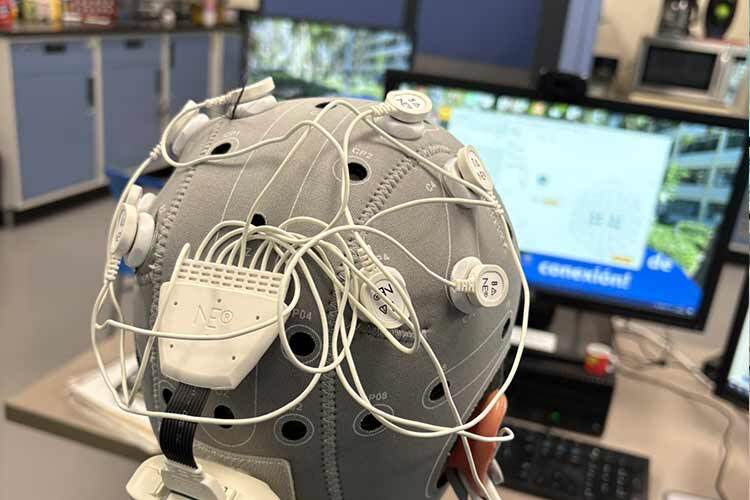It’s not breaking news that physical activity is good for your health, but in this article, we clear up doubts—drawing from current scientific sources and testimonials—about what constitutes exercise (is walking the dog the same as swimming for over 30 minutes?), what type of training is ideal for maximizing its benefits (cardiorespiratory, muscular), and what its benefits are beyond aesthetics. These are basic and genuine questions that many of us probably have.
According to María Luisa Ballí, doctor and professor at the School of Medicine and Health Sciences at Tec de Monterrey, it’s important to differentiate “between physical activity, which involves movement like cleaning the house or preparing meals, and physical exercise, which is a step further. It’s a planned, structured activity, like going for a 45-minute spin class three times a week, with a specific goal,” she explains.
The original reason for exercising was survival, as discovered by researcher David Raichlen after observing the Hadza, a tribe of hunter-gatherers in Tanzania, for years. His conclusion is that our ancestors naturally stayed active while searching for water or food (hunting, digging, carrying, moving). As our lifestyle has drastically changed, we had to find another way to burn energy: through sports.
Beyond Aesthetics
We are familiar with the superficial benefits—so to speak—of exercise, and often, that’s why we engage in it. To look better aesthetically, we aim to lose fat or weight, build more muscle mass, and/or tone our muscles.
However, sports have much more significant benefits, both physically and mentally. It impacts the proper function of various organs, bones, and muscles and also promotes a healthier mental state by releasing various substances during physical activity.
An example of this is the effect on incarcerated individuals. Interviewed for TecScience Podcast (in Spanish) “Historias para mentes curiosas,” Ricardo Valadez, a former trainer in various prisons in Mexico City for over six years, recounts that prisoners claimed to feel less irritable after their training sessions. Women said they felt free during the hour and a half of physical activity with Ricardo.
Anti-inflammatory Exercise
Numerous studies support the impact of cardiorespiratory training (aerobic activities like running, swimming, dancing, cycling, etc.) on health. Still, there is little evidence regarding the importance of muscle exercise (focusing on working muscles, such as functional training or weightlifting). This is because it would require a much longer and deeper follow-up. However, the limited evidence is enough for cognitive benefits to be recognized in strength training.
According to epidemiologist María Paulina Correa, an associate professor at the Institute of Nutrition and Food Technology at the University of Chile, when a person has high-quality muscle, i.e., functional and performing its job correctly, “the muscle begins to release a series of markers called myokines, which have an anti-inflammatory effect. And one of the first things inflammation targets when these substances are released is the brain.”
The brain of someone who doesn’t exercise likely has some inflammation. An inflamed brain is at greater risk of neurodegenerative deterioration associated with mental disorders such as depression and anxiety, says Correa.
A study published in 2022 in the British Journal of Sports Medicine revealed that the effect of physical exercise against symptoms of mild to moderate depression is similar to that of drugs. Another study from the same journal suggests that sports could be 1.5 times more effective than antidepressants. This is because exercise activates neurotransmitters such as serotonin, the happiness neurotransmitter.
Other studies focus on how exercise helps combat anxiety. In this case, it has been discovered that when patients can internalize the sensations produced by physical activity—how they breathe, how their heart rate increases, how their body temperature rises—and are fully attentive at the moment, it helps reduce distress and despair, common characteristics of anxiety disorders. “The key here is to engage in sports regularly,” says Dr. Correa.
In the case of Attention Deficit Hyperactivity Disorder (ADHD), studies have shown that exercise promotes the expression of three key neurotransmitters. One is serotonin, another is dopamine, related to motivation, pleasure, and our sensitivity to reward, and the third is norepinephrine, which also helps improve attention.
Exercise and Academic Performance
A study from the Institute of Nutrition and Food Technology at the University of Chile focused on the effects of exercise on cognitive function related to academic performance. The study followed student children over 30 years, and the results have been published in various scientific journals such as Obesity, Pediatric Research, and Advances in Life Course Research.
There were three key processes in which exercise had an impact on learning. First, neurogenesis: the ability to generate new neurons and restore those that are not functioning properly. Exercise allows the generation of new neurons, observed even in older adults who engage in some discipline.
The second is the expression of neurotrophins; physically active individuals release proteins that support the survival of neurons and allow them to specialize in specific functions.
The third is the formation of new dendritic connections, through which nerve impulses are transmitted. This improves the entire neural communication network, generates synapses, and helps consolidate memory.
The wonderful thing about exercise is that it’s never too late to start. Studies reveal that regardless of the age at which physical activity begins, it’s possible to reverse the damages of a sedentary lifestyle to some extent. And for those who have been consistently active throughout their lives, the great reward is having longer telomeres—the ends of chromosomes that prevent them from breaking or damaging—resulting in a kind of biological youth.


















